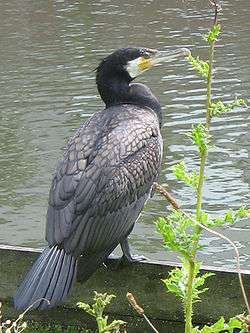Definify.com
Webster 1913 Edition
Cormorant
Cor′mo-rant
(kôr′mō̍-rant)
, Noun.
[F.
cormoran
, fr. Armor. mōr-vran
a sea raven; mōr
sea + bran
raven, with cor
, equiv. to L. corvus
raven, pleonastically prefixed; or perh. fr. L. corvus marinus
sea raven.] 1.
(Zool.)
Any species of
Phalacrocorax
, a genus of sea birds having a sac under the beak; the shag. Cormorants devour fish voraciously, and have become the emblem of gluttony. They are generally black, and hence are called sea ravens
, and coalgeese
. [Written also
corvorant
.] 2.
A voracious eater; a glutton, or gluttonous servant.
B. Jonson.
Webster 1828 Edition
Cormorant
CORMORANT
,Noun.
1.
The water raven, a large fowl of the pelican kind; the head and neck are black; the coverts of the wings, the scapulars and the back are of a deep green, edged with black and glossed with blue. The base of the lower mandible is covered with a naked yellow skin, which extends under the chin and forms a sort of pouch. This fowl occupies the cliffs by the sea, feeds on fish, and is extremely voracious.2.
A glutton.Definition 2026
cormorant
cormorant
English

A cormorant
Noun
cormorant (plural cormorants)
- Any of various medium-large black seabirds of the family Phalacrocoracidae, especially the great cormorant, Phalacrocorax carbo.
- 1876, "Burmah" in the Encyclopædia Britannica, 9th ed., Vol. IV, p. 552:
- Aquatic birds of various kinds are very numerous, such as geese, darters (Flotus melanogaster), scissor-bills (Rhynchops nigra), adjutants (Leptoptilos argala), pelicans, cormorants, cranes (Grus antigone, in Burmese gyoja), whimbrels, plovers, and ibises.
- 1876, "Burmah" in the Encyclopædia Britannica, 9th ed., Vol. IV, p. 552:
- A voracious eater; a glutton.
- (Can we find and add a quotation of Ben Jonson to this entry?)
Synonyms
- (voracious eater): see Wikisaurus:glutton
Translations
seabird
|
|
Adjective
cormorant (comparative more cormorant, superlative most cormorant)
- Ravenous, greedy.
- William Shakespeare, Love's Labour's Lost, Act I, Scene 1
- Let fame, that all hunt after in their lives,
- Live regist'red upon our brazen tombs,
- And then grace us in the disgrace of death;
- When, spite of cormorant devouring Time,
- The endeavour of this present breath may buy
- That honour which shall bate his scythe's keen edge,
- And make us heirs of all eternity.
- William Shakespeare, Love's Labour's Lost, Act I, Scene 1